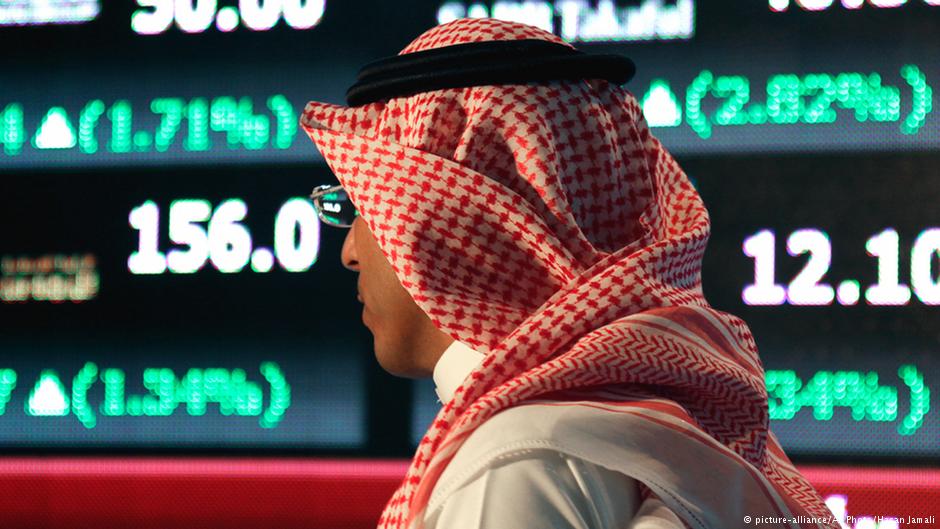Saudi Arabia has run a massive fiscal deficit in 2015, due to low oil prices. Now the Saudi Finance Ministry has announced plans to reduce subsidies on energy, and investments to try to diversify the economy.
On Monday in Riyadh, the Saudi Arabian Ministry of Finance released a 10-page report summarizing the state of the Kingdom’s finances and economy, with government budget figures and estimates for this fiscal year and next. The report shows a staggaring fiscal deficit of 367 Saudi riyals (SR) for FY 2015 (about $98 billion or 89 billion euros) – nearly 38 percent of the government’s total expenditures.
“Oil revenues are expected to reach SR 444.5 billion, representing 73 percent of [the government’s] total revenue” for FY 2015, the statement said, highlighting the petrostate’s continued extreme dependence on oil exports.
A barrel of Brent crude was trading at $36.73 on Monday, down 3 percent on the day – an 11-year low. The last time the price of oil was anywhere near this low was for a brief time in the wake of the global financial crisis of 2008, and before that, in 2004.
Total Saudi government revenues were estimated at SR 608 billion, of which non-oil revenues such as customs duties, investment dividends, and documents fees totaled SR 163.5 billion. While non-soil revenues remain a small part of the budget, they’ve increased 29 percent compared to FY 2014, the report said.
Over budget
“Actual expenditure for the current fiscal year is expected to reach SR 975 billion,” or 13 percent more than had been budgeted, according to the finance ministry. It attributed much of the overspending to increased expenditures for military and civil service salaries.
A large, unexpected spending contingency arose beginning in March 2015, when Saudi Arabia embroiled itself in an expensive military intervention in neighboring Yemen, the Arab world’s poorest country, against members of a non-Sunni tribe, the Houthi, which had launched a successful rebellion against Yemen’s contested government.
Running down savings
The Saudi central bank, the Saudi Arabian Monetary Agency (SAMA), has plenty of money set aside for a rainy day – or more accurately, for a few years of deficit spending. It owns a vast stock of foreign currencies, deposits with banks abroad, and investments in foreign securities, much of it dollar-denominated.
SAMA reported the total value of its assets at the end of November as SR 2,441,282 million (about $651 billion). That’s a lot of money, but the finance ministry knows it can’t carry on spending it down at the current rate of fiscal deficits for many more years. That means it has to start thinking about increasing non-oil revenues and cutting wasteful spending, since oil prices are not expected to recover soon.
Reforms planned
That’s why the finance ministry outlined an ambitious set of economic, fiscal and structural reforms in its new report. In addition to collecting more revenue from sources other than oil sales, it aims to become more systematic about controlling government costs – both by increasing the efficiency of major project expenditures and by reining in the growth of wages, salaries and allowances.
The government says it intends to introduce policies over the next five years to “achieve wide structural reforms in the national economy and reduce its dependence on oil,” the statement said. This will include a range of privatizations, and efforts to reduce red tape and improve transparency and accountability.
The government also plans to focus spending on development projects and programs that “serve the citizen directly,” listing education, health, security, social and municipal services, water and sanitation, electricity, roads, electronic transactions, and scientific research as planned investment categories.
Taxes and subsidies
Saudi Arabia does not collect income taxes, since it takes in so much money from oil sales through the government-owned oil company that it has not felt the need to do so. But Monday’s statement suggests that the finance ministry realizes that this cannot go on forever.
The statement says the ministry will review current levels of fees and fines, introduce new fees, and complete “the necessary arrangements for the application of the value added tax (VAT)… in addition to… additional fees on harmful goods such as tobacco, soft drinks and the like.”
So it appears there are still no income taxes planned, but the general concept of collecting taxes is making headway in Riyadh. The finance ministry also plans to establish a unit responsible for public debt management, in order to improve the Kingdom’s ability to borrow both domestically and internationally, “thus contributing to the market for sukuk and local bonds,” Monday’s statement said.
Another significant category of reforms mentioned in the document is a review of subsidies, including “revision of energy, water, and electricity prices gradually over the next five years, in order to achieve efficiency in energy use, conserve natural resources, stop waste and irrational use.”
It’s a long overdue acknowledgment of the pernicious effects of supplying petrol and electricity nearly for free to Saudi residents, leading to notoriously wasteful habits such as leaving cars idling for extended periods with air conditioners on while people shop at the mall. Petrol in Saudi Arabia costs around 15 cents per liter – far too little to motivate conservation.




